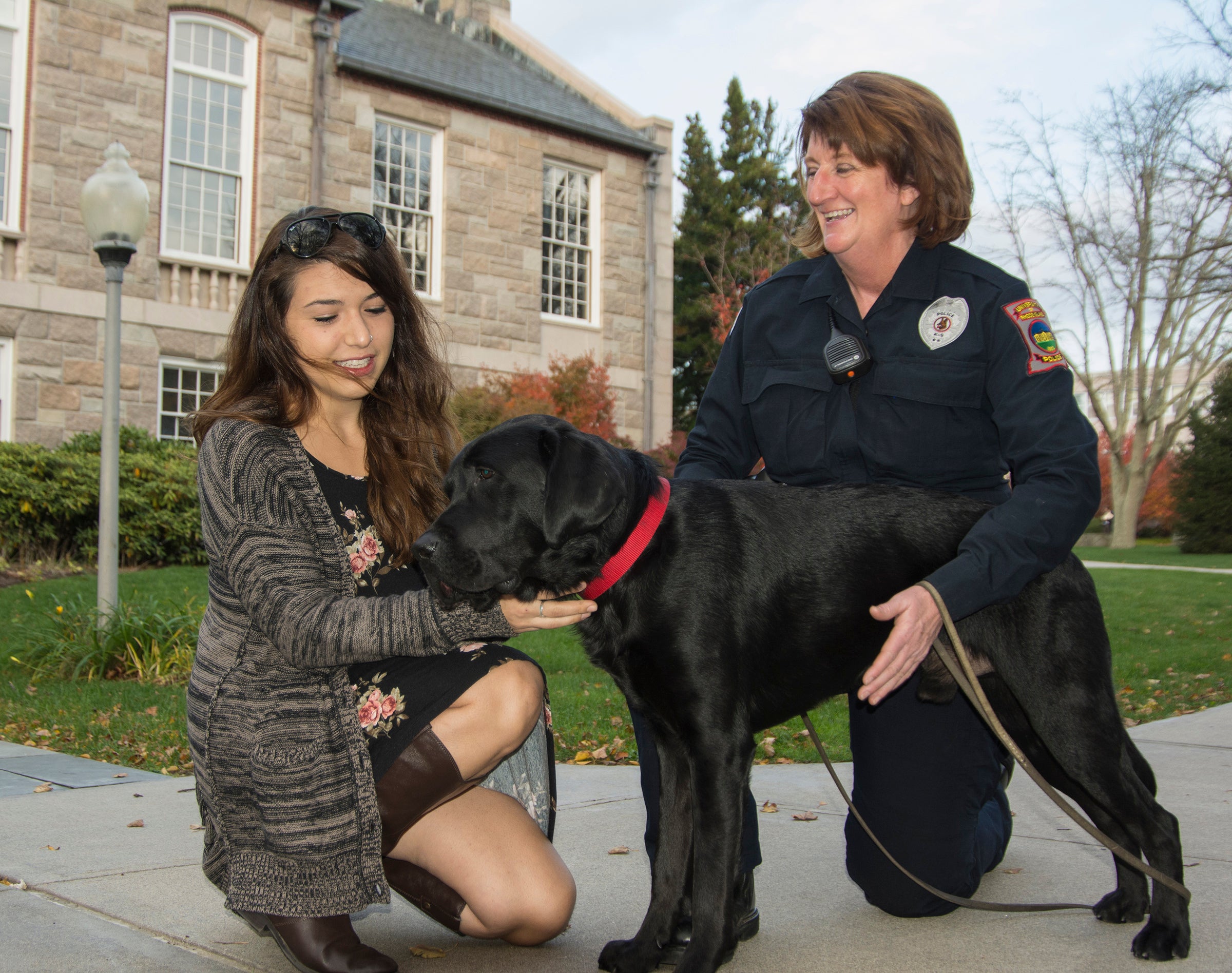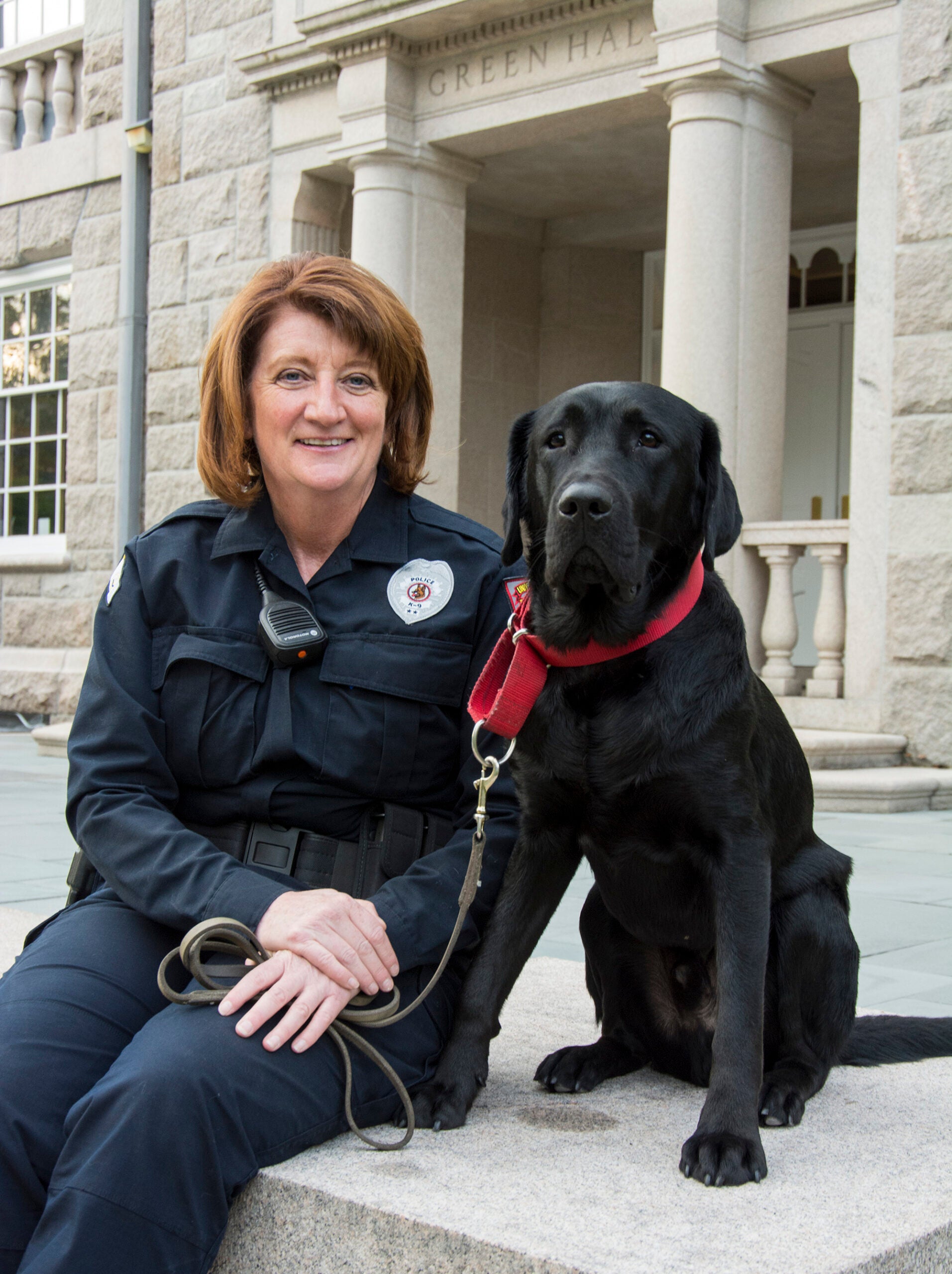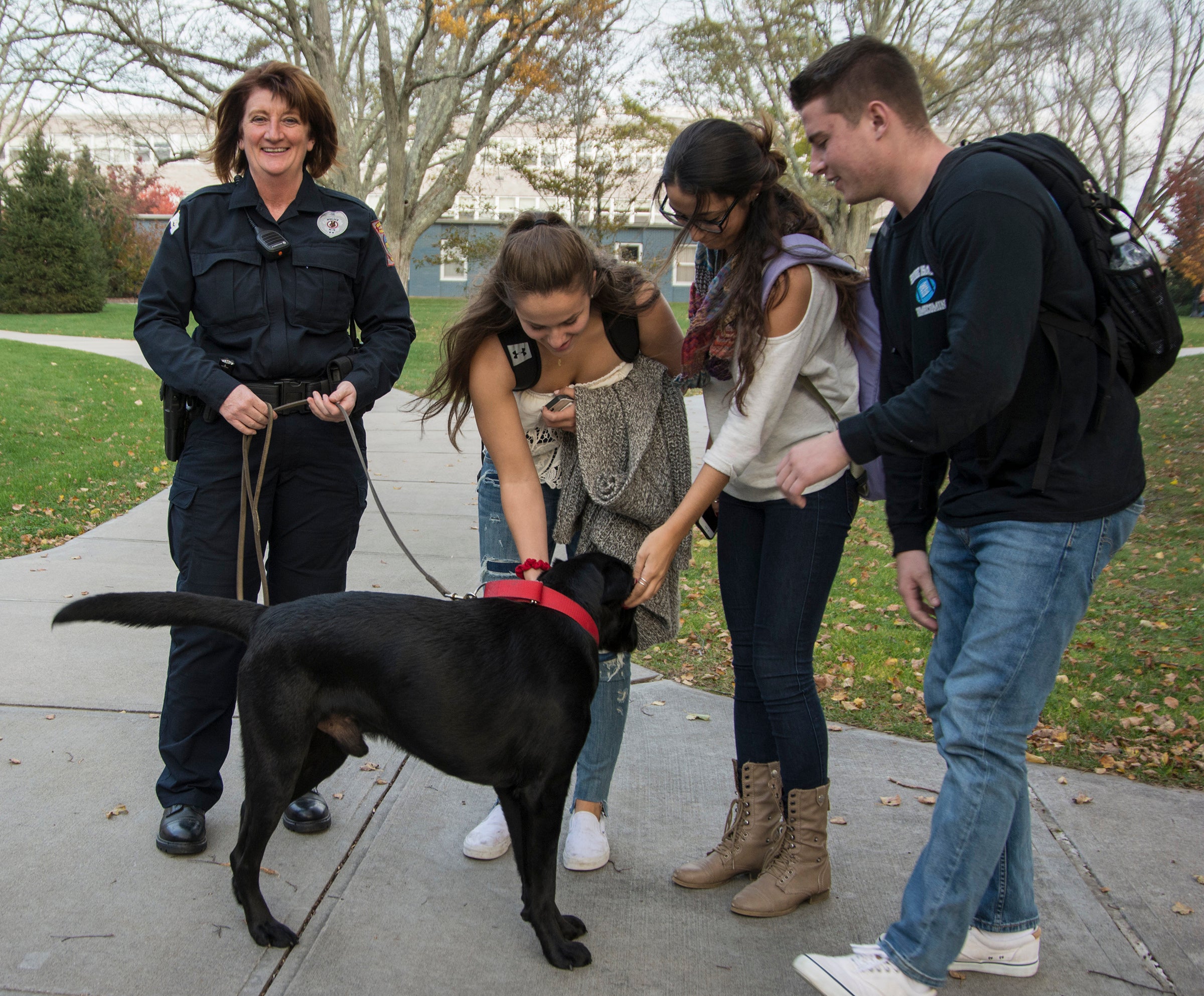KINGSTON, R.I. – November 22, 2016 – The newest member of the University of Rhode Island Police Department is also its youngest and lightest officer. He has a sweet disposition, weighs just 70 pounds and is going on 20 months old. Oh, and he has four legs.
Meet Officer Figaro, the department’s first explosive-detecting dog, who has been on the job about a month after completing training with the Connecticut State Police Canine Training Unit, Emergency Services Unit Oct. 28. URI is the only university or college in the state and one of only three in New England to have a trained canine on the force that can detect bombs and bomb residue, according to URI Police Maj. Michael Jagoda. Worcester Polytechnic Institute and Yale University are the other New England schools.
Since completing six weeks of training with URI Police Sgt. Erica Vieira of Richmond, Figaro has been meeting students, faculty and staff. If a recent walk with Figaro around the grounds outside Green Hall was any indication, the black Labrador retriever is destined to become a campus favorite. As Vieira introduced Figaro to students, his tail wagged as he was petted. He loved the attention.
Vieira, who already had lengthy experience with a search and rescue dog, completed eight weeks of training with the Connecticut State Police canine center before working with Figaro. She and Figaro trained with 11 other law enforcement officers and 11 other dogs. In their training, the canines were exposed to thousands of odors.

Prior to her work with Figaro, Vieira trained and worked with her beloved German shepherd, Maxwell, on two search dog teams as well as Rhode Urban Search and Rescue Task Force 1 and 2 starting in 2007. When she was not on duty at URI, she and Maxwell trained in the woods, swamps, and at ponds and lakes, obstacles courses and buildings. Vieira and Maxwell earned numerous national certifications for search and rescue work and were a resource for area law enforcement and the Rhode Island Emergency Management Agency.
But just two weeks before Vieira started training in Connecticut, her longtime friend and partner, who accompanied her for 10 years on numerous Polar Plunges to benefit Special Olympics, died after his eight years of service.
Vieira still misses Maxwell, but she jumped right into working with Figaro.
“It was challenging for a lot of reasons, including mourning the loss of Max, but another was the difference in training,” Vieira said. “Wilderness and urban search and rescue training programs are done without a leash. When such dogs are working an active investigation, they operate without a leash. They respond to hand commands and voice prompts.”
Even though training Figaro was different, it went well because Vieira said “he has a good nose for explosives.”
Figaro does his work while on a leash and he is always at Vieira’s side. In addition, he is only fed when he completes his work, whether that is training or an actual investigation. Figaro is also always fed by hand, and he will never eat out of a bowl.
“Max was special, and he was so good and well trained that he could find anyone no matter the circumstances,” Vieira said.

But Figaro is quickly finding a place in Vieira’s heart, too. “He is such a sweet dog and he is great to work with. He is the loviest dog ever. But he becomes serious when he goes to work. When he enters a building, he immediately starts sniffing walls, floors and seams.”
Figaro came from the Guiding Eyes Program, where he was trained for one-and-a-half years. “The puppy raiser there did a great job, but Figaro was a little too rambunctious to be a seeing eye dog,” Vieira said.
Three years ago Vieira had approached then Maj. Stephen Baker, now URI police chief and director of public safety, about obtaining a retired military dog for bomb detection. But at the time, the department was undergoing significant changes, including the move to becoming an armed police force.
But when Jagoda arrived at URI a little more than a year ago after a distinguished career with the Connecticut State Police, the time was right.
“I felt this was one step that was consistent with one of President (David M.) Dooley’s Transformational Goals, which is to make URI a global leader,” Jagoda said. “I can see that the University is gaining more attention and respect around the world, and that means we are going to be bringing many more national and international dignitaries to campus. Our sporting and entertainment events are getting bigger as well.”
Jagoda also knew that resources for bomb detection were thin in South County.
“We have many big events, including commencement, that require the skills of a trained officer and canine to conduct building and facility sweeps to ensure the safety of our community. It’s also an efficiency issue. If someone finds a suspicious package in the Memorial Union, Sgt. Vieira and Figaro are able to respond immediately.”
Before Figaro was on campus, URI police had to wait a significant amount of time for the Rhode Island State Police to respond with its canine unit in such a situation.
“This is an opportunity for our community to have even greater confidence in our police department,” Jagoda said. “Sgt. Vieira and Figaro reinforce our community policing approach.”
Jagoda selected Vieira for two reasons: “Her love of animals, especially working police dogs, and from day one, she bought into our community policing program.”
Such a step could have happened only with the support of Baker and Dooley’s senior leadership team, Jagoda said.
“Figaro has already met the leadership team, including President Dooley, support staff, members of the legal counsel’s team and those in the provost’ office. Everyone loved him,” Vieira said.

